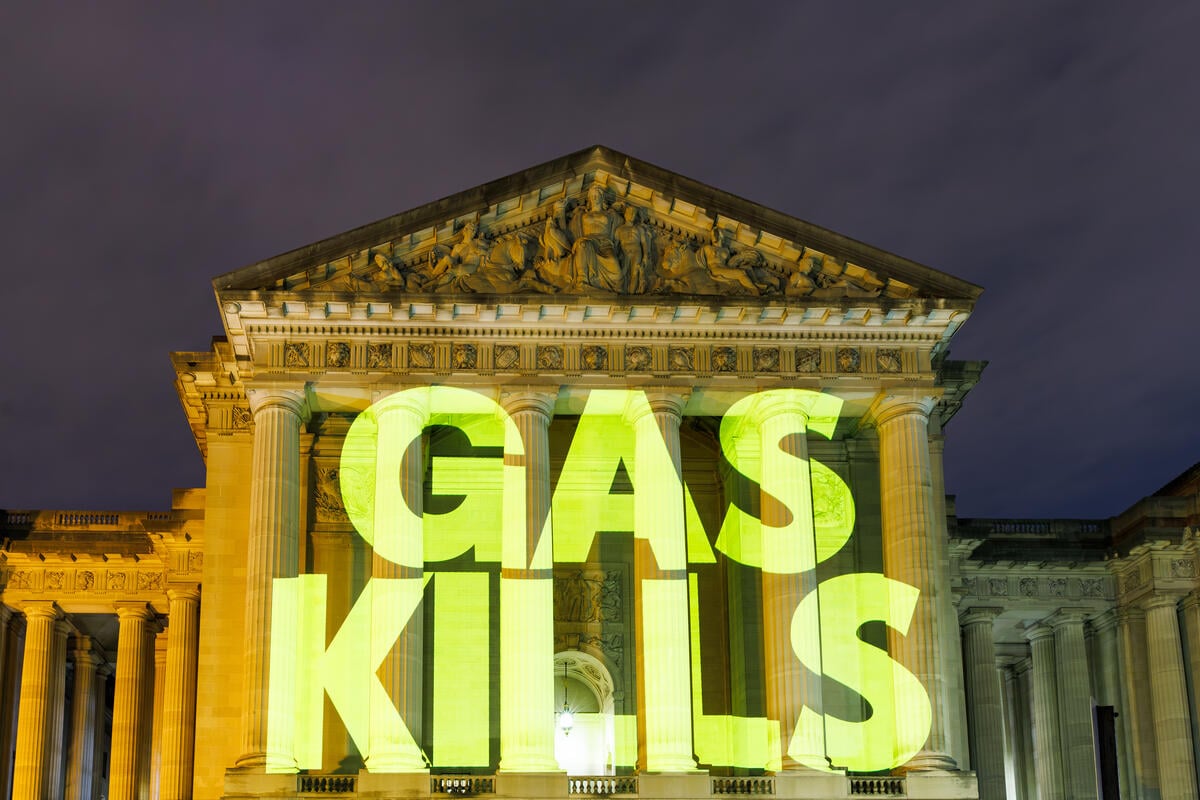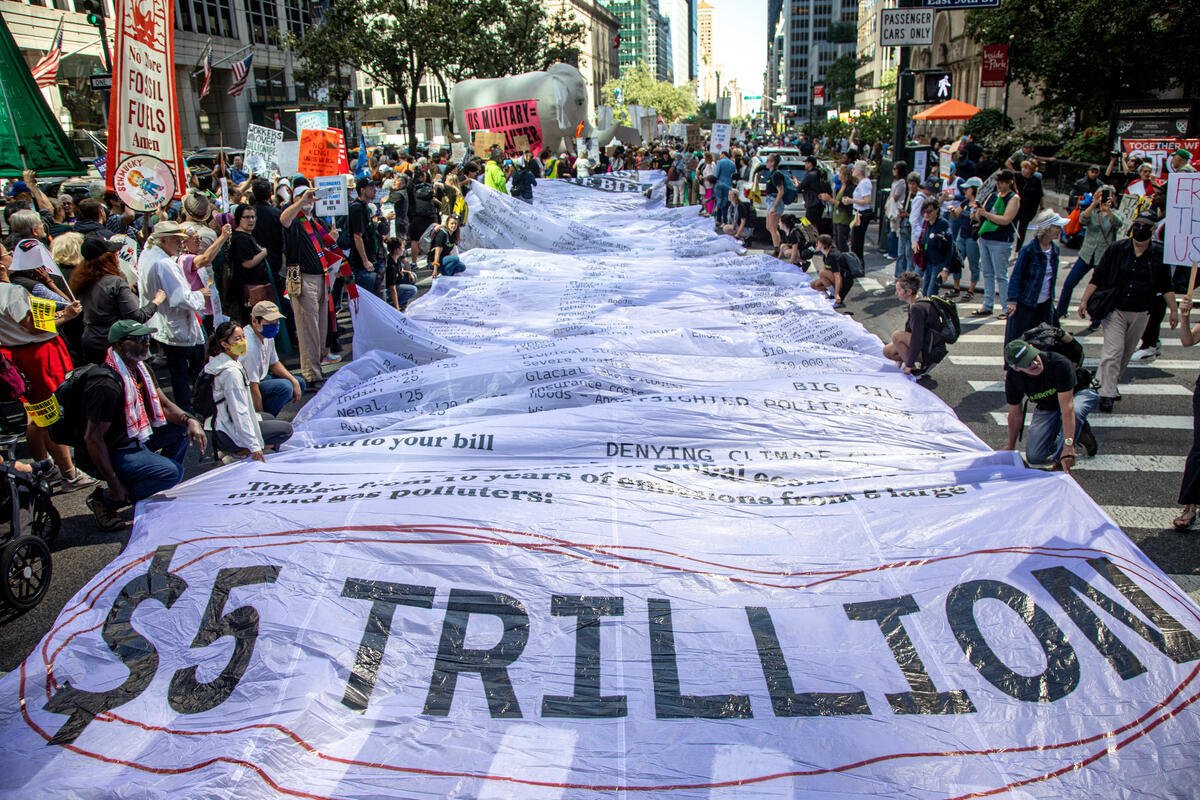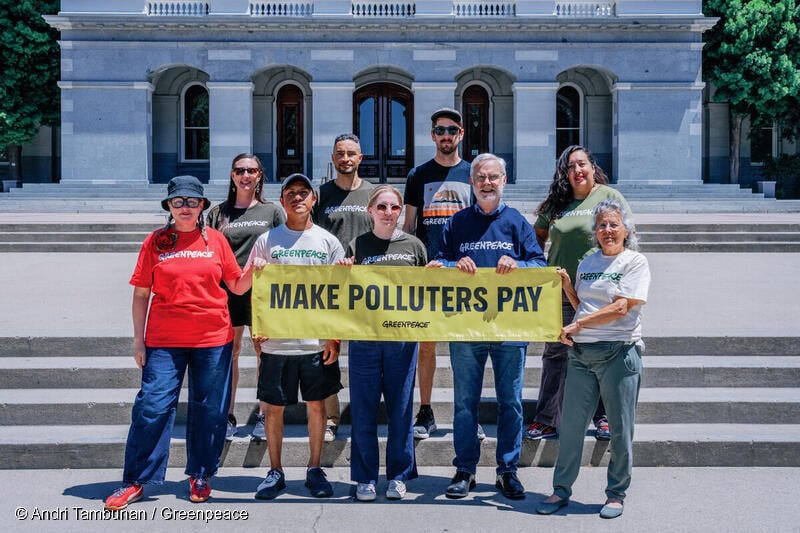
The climate crisis is here, and we are already paying for it. You. Me. Everyone.
The past two years were the hottest ever recorded in the modern era. The city of Phoenix, AZ suffered through 100 straight days of greater than 100°F weather in 2024. Hurricane Helene sent catastrophic floods tearing through parts of Tennessee and North Carolina. California’s wildfire “season” continues to expand into a year-round phenomenon, extending into the winter months. In January of this year, devastating fires near Los Angeles destroyed 16,000 structures and killed 29 people.
The human impact of these events alone is unfathomable. The economic price tag in the aftermath is growing ever larger. In 2024 alone, NOAA documented 27 weather or climate disaster events with losses exceeding $1 billion, leading to $184.8 billion in total damages and 568 deaths.
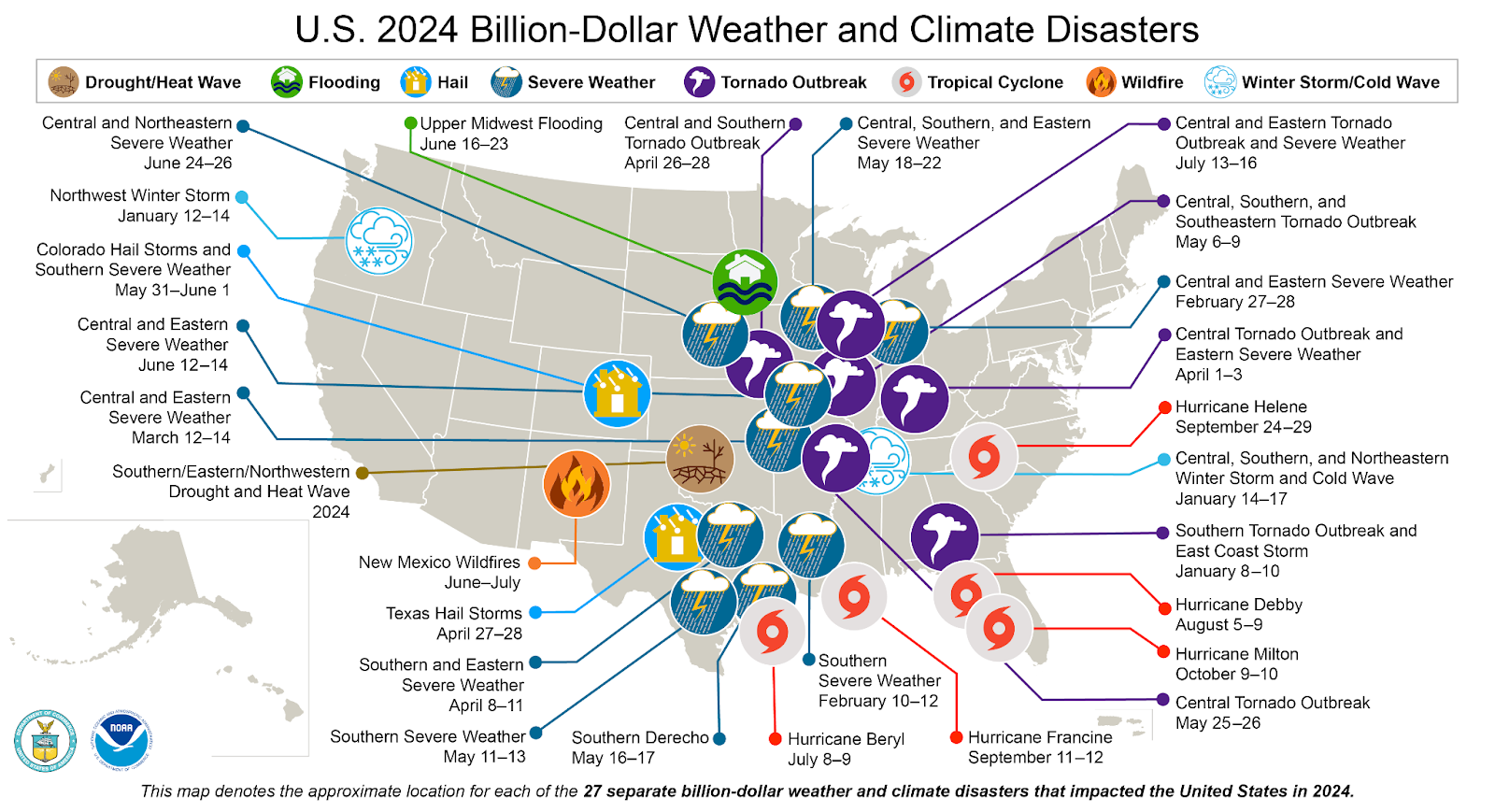
While climate disasters are costing us billions we don’t have, the oil and gas industry is comfortably earning trillions. In 2023, the industry earned an estimated $2.7 trillion in income globally.
Corporate and political elites across the world have foolishly wasted decades on inaction, delay and expensive propaganda. In truth, delaying the necessary reductions in planet warming pollution is similar to refusing to pay your credit card when it is due. Before too long, the penalties and interest charges start piling up, and you can find yourself in a real mess.
Our climate bill is overdue, but the fossil fuel industry is doing everything they can to avoid paying. They want to avoid any liability for their actions, all the while pushing the rising costs off on to taxpayers; or energy ratepayers; or just ordinary families stuck with higher bills, an unhealthy environment, looming climate hazards, and a failing insurance market.
This is unjust and unacceptable. We have to make the polluters pay.
All The Ways that Fossil Fuels Take Money Out of Your Pocket
Over and over, the media and politicians have conditioned us to think that protecting the environment is a “luxury” that sadly we just can’t afford – as if a healthy biosphere that sustains life could ever be separated from “the economy.” The reality is just the opposite: saving the planet is a bargain compared to the insanely expensive climate crisis.
Fossil fuels and climate change are forcing us to spend top-dollar in multiple ways.
- Direct Climate Impacts. Climate science has established that climate change is driving numerous impacts both in the U.S. and around the globe – from sea-level rise to heat waves to a melting Arctic. A 2023 report from the U.S. Treasury focused on three impacts that could harm the household finances of Americans in certain parts of the county: flooding, wildfire, and exposure to high heat.
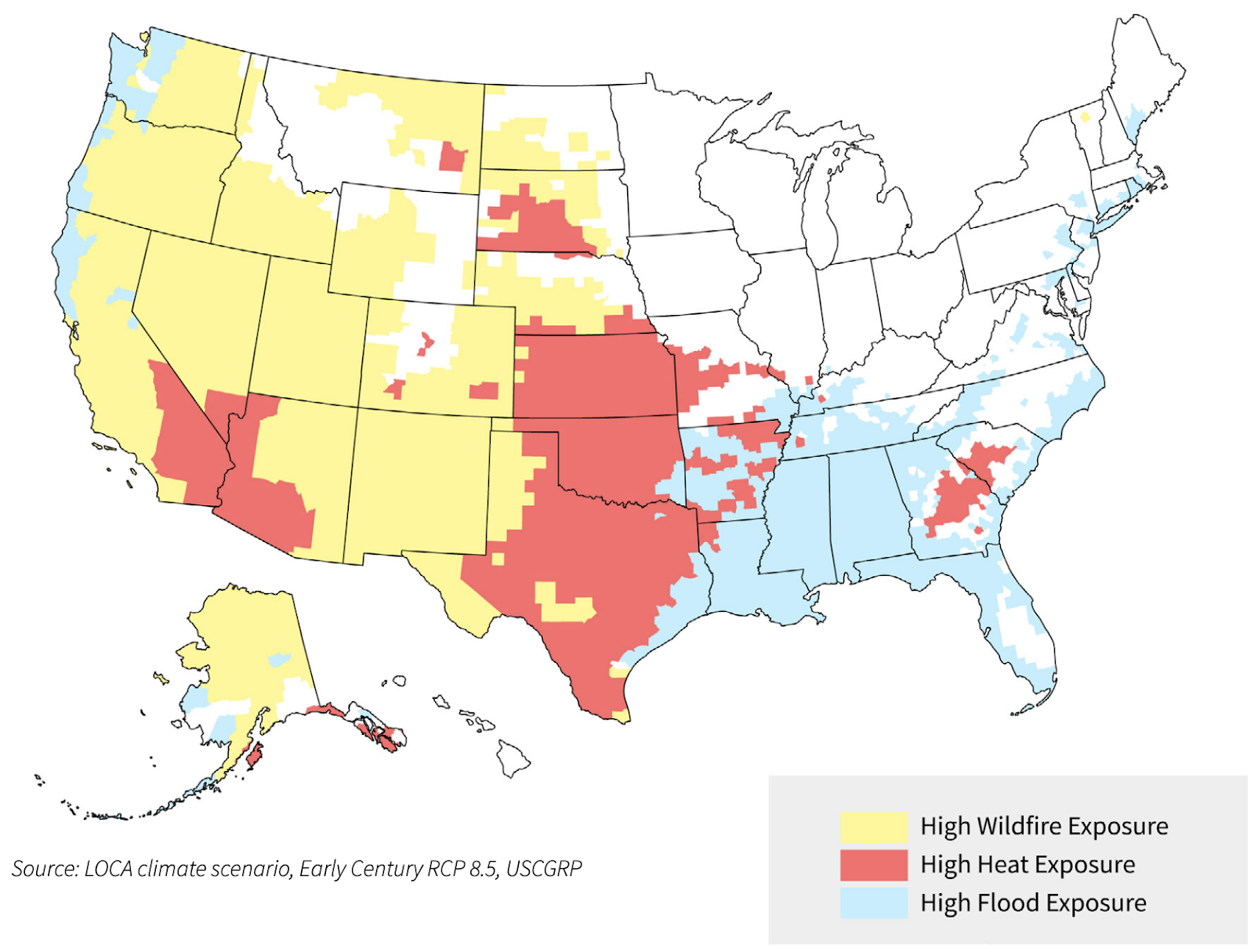
The Treasury report found that these climate hazards can destroy property and public infrastructure, close businesses and eliminate jobs, spike gas and energy prices, interfere with banking and emergency services, and send people to the hospital. Public polling shows that more than one-third of U.S. adults say they have been affected by an extreme weather event in the past 2 years.
- Air Pollution Damages. Burning fossil fuels also produces harmful air pollution detrimental to human health, and is responsible for as many as 350,000 premature deaths in the U.S. every year. This means that on top of direct climate damages, fossil fuels are piling on billions more of health-related costs. To give just one narrow example, research by Greenpeace USA and Sierra Club found that permitted air pollution from the small number of operating LNG export terminals alone could cause 60 premature deaths and nearly $1 billion in total health costs every year.
- Paying To Adapt. Adapting to a changing climate requires significant time and resources to do well – and the longer we wait, the pricier it becomes. Cities will need to build sea walls. Farmers will need to invest in water storage to weather longer periods of drought. Homes will need funding to become more resilient to fire risk.
- Fossil Fuel Subsidies. Oh yeah, don’t forget that every year the U.S. tax system provides fossil fuel subsidies worth as much as $20 billion to oil and gas producers!
- Collapse of the Economic Safety Net. When disaster does strike, most people have to rely on government disaster relief, as well as the private insurance markets. But even that basic security isn’t guaranteed in this new era. After the California fires, President Trump corruptly threatened to withhold federal aid until the state acquiesced to his policy demands. Since then, Trump has cut staff and eliminated disaster preparedness grants at FEMA, as well as cut staff at the Forest Service and the National Weather Service.
To top it all off, it is becoming increasingly clear that climate change is driving the insurance market toward collapse.
Insurance Collapse
Donald Trump may not believe in climate change, but your insurance company sure does. Insurance companies can’t afford to be blinded by climate denier propaganda, which is why real, physical climate damages are now being reflected in insurance premiums and decisions about coverage.
Data from the insurance industry suggests that from 2002 to 2022, over one-third of insurance losses (or $600 billion) were attributed to climate change, and that those losses were increasing. One recent study predicts that climate change could reduce American home values by a staggering $1.47 trillion over the next 30 years – with the losses concentrated in places with the largest climate impacts. As climate impacts expand, even places that were once dubbed “climate havens” are no longer safe from harm.
In December 2024, the Senate Budget Committee released a report showing that climate risk is already increasing insurance “non-renewal rates” across the United States. Analysis of the data shows that areas with higher risk of fire and hurricanes had higher rates of insurance non-renewal.
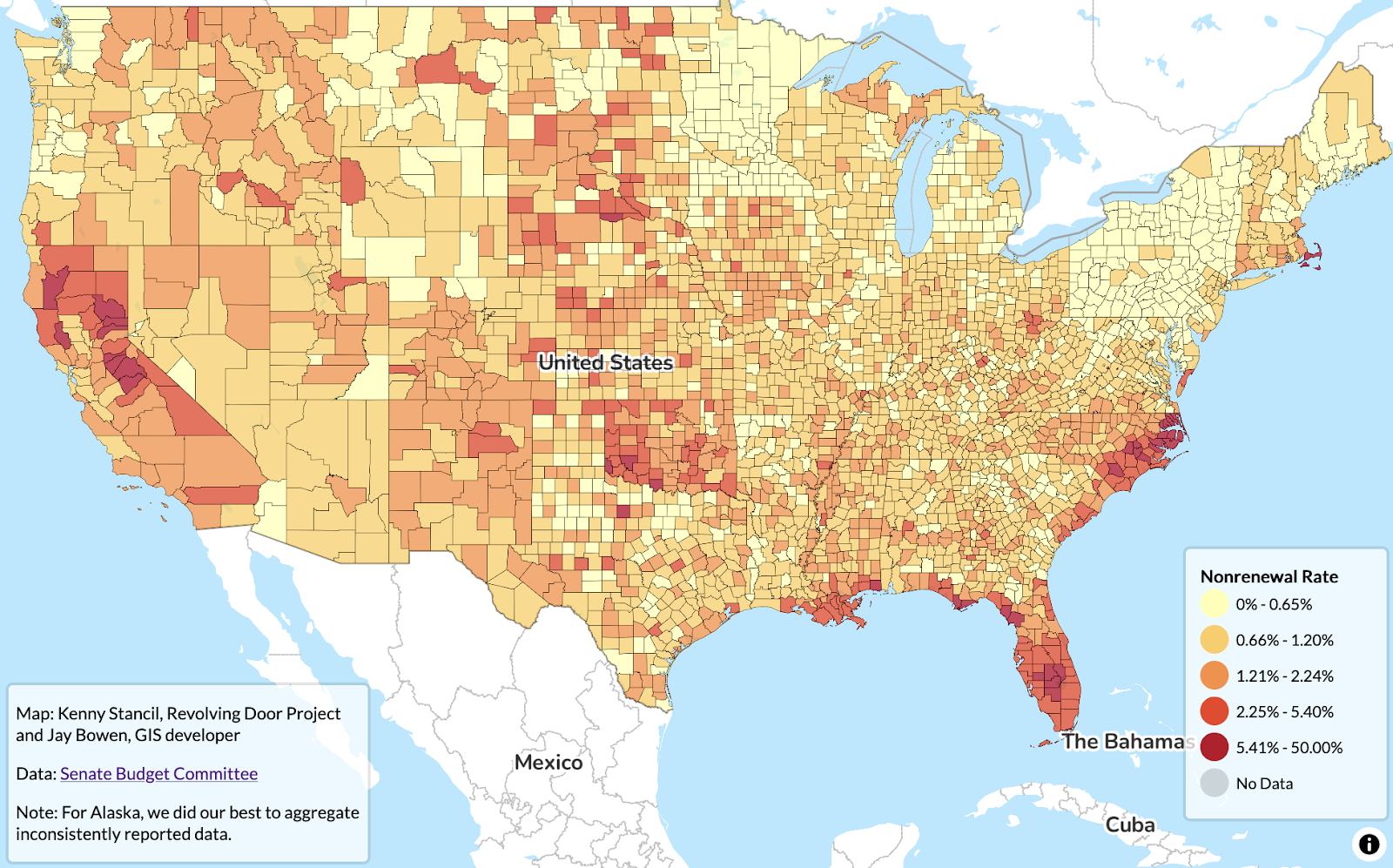
Industry insiders are warning that if temperatures continue to rise, the insurance industry will simply be unable to offer coverage for many risks, which would then spread through other parts of the economy. For example, if you cannot get insurance on a house, you probably can’t get a mortgage either. This could lead to “a systemic risk that threatens the very foundation of the financial sector” in the words of one expert. Such a scenario could also lead to large migration of people away from the uninsurable parts of the country.
We are already seeing parts of this dynamic play out in California. The January 2025 California fires will likely be the most expensive disaster in American history, with insured losses costing as much as $75 billion and total losses potentially greater than $250 billion. As a result, insurers have requested large rate hikes or have left the state entirely, leaving the state-run FAIR plan as the only option for many.
Good News, We’ve Found the Culprits
We don’t have to scour the planet to figure out who is to blame for these mounting crises. Independent researcher Rick Heede and colleagues have created a database ranking which coal, oil and gas corporations and state-owned companies are responsible for the majority of historic carbon emissions. Topping the list are the former U.S.S.R. and China’s coal production, but the corporations Saudi Aramco, Chevron and ExxonMobil take the #3, #4 and #5 spots on the list.
Peer-reviewed studies have taken the next step to actually attribute certain climate impacts to specific climate polluters. Studies have linked these corporate polluters to a rise in CO2 and surface temperature, sea-level rise, ocean acidification, wildfire risk, and more. A recent study has even outlined a methodology to establish “an ‘end-to-end’ attribution that links fossil fuel producers to specific damages from warming.”
With this data in hand, citizens, cities, states, and nations have turned to the courts to hold these corporate polluters accountable for the damages from their products. Some lawsuits have focused on investigations showing that Exxon and other oil companies had long known about the risks of climate change but acted to halt climate action. Other lawsuits are more focused on recouping the costs of local climate damages. In May, the daughter of a woman who died from extreme heat during a climate-amplified heat wave sued seven oil and gas companies for wrongful death.
At the federal level, the Trump administration is busy firing scientists, illegally ending grants, halting data collection, and reversing what progress we have made on fighting climate pollution. But even while the federal government refuses to show true climate leadership, states and local governments have an opportunity to keep hope alive for climate sanity. States such as Vermont and New York have begun passing laws to make polluters pay directly. Sometimes called “climate superfund” laws, the idea is to impose a fee, or a climate damage tax, on fossil fuel companies in order to fund needed climate adaptation programs. Other states like California, New Jersey, and Oregon have similar pieces of legislation moving through their State Congresses.
No Polluter Pardons
These lawsuits and state laws are gaining momentum, so naturally, these corporate cronies are doing everything they can to shirk their responsibilities. The fossil fuel industry may attempt to slip some form of “immunity” from liability into must-pass legislation, similar to the shield law that protects gun manufacturers.
People in positions of power, like President Trump, are even going a step further and doing what they can to shield polluters from scrutiny. Trump issued an Executive Order to protect fossil fuels against state overreach, and even directed the DOJ to try to block these lawsuits and laws in court. And infuriatingly, Trump recently eliminated NOAA’s database of climate disasters, depriving us of even basic information about the crisis. Moves like these can try to obscure the consequences of climate chaos, but they cannot erase real pain and suffering felt by communities experiencing these disasters.
It’s time we stand together, hold these brazen culprits accountable and demand they pay for the damage they’ve caused. Take action with us and sign the Polluters Pay Pact today.

